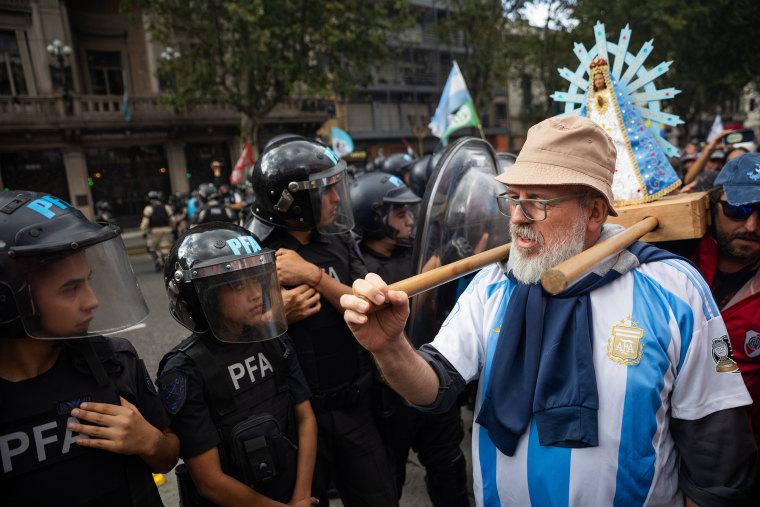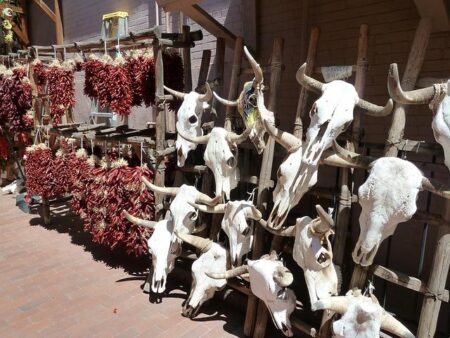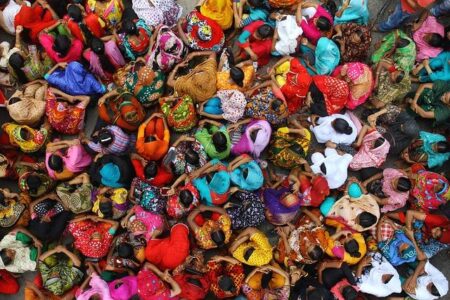Thousands of demonstrators flooded the streets of Buenos Aires and other major cities across Argentina this week in a powerful display of dissent following the imprisonment of former Vice President Cristina Fernández de Kirchner. The protests, which erupted shortly after the court ruling was announced, highlight the deep political divisions within the country and underscore widespread concerns over the judicial process. As tensions escalate, the nation faces a critical moment that could shape its political landscape for years to come.
Massive Protests Erupt Across Argentina Following Cristina Kirchner’s Imprisonment
In the wake of the controversial sentencing of former Vice President Cristina Kirchner, cities across Argentina have witnessed unprecedented demonstrations. Protesters, ranging from political supporters to human rights activists, flooded major avenues in Buenos Aires, CĂłrdoba, and Rosario. The outcry has been characterized by chants demanding justice reform and calls for the immediate release of Kirchner. Many demonstrators carried signs with slogans such as “Justice for All” and “End Political Persecution.” These protests highlight the deep divisions within Argentine society regarding the judicial system and political accountability.
Authorities have responded with heightened security measures, deploying police forces to maintain order while allowing freedom of expression. Observers note a mix of peaceful vigils and occasional clashes, with social media platforms buzzing with live updates and mobilization efforts. Key demands voiced by the protesters include:
- Revision of the judiciary’s handling of high-profile cases
- Greater transparency in legal proceedings
- Protection of civil liberties amid political turmoil
| City | Estimated Attendance | Police Presence |
|---|---|---|
| Buenos Aires | 15,000+ | 2,500 officers |
| CĂłrdoba | 7,000+ | 1,200 officers |
| Rosario | 5,000+ | 900 officers |
Analyzing the Political Ramifications and Public Sentiment Behind the Demonstrations
The recent wave of demonstrations sweeping across Argentina following the imprisonment of former Vice President Cristina Kirchner has laid bare a deeply polarized political climate. Supporters view her detention as a politically motivated move orchestrated by rivals aiming to dismantle the faction she represents, while opponents argue it signifies a long-overdue reckoning for alleged corruption. The unrest reflects broader concerns about judicial independence and governance stability, as citizens grapple with the legitimacy of legal proceedings intertwined with high-stakes politics.
Public sentiment remains sharply divided, with key demographics voicing contrasting views that signify the complexity of Argentina’s socio-political fabric. Protesters’ messages often encompass:
- Calls for justice reform: Advocates demanding transparent and unbiased judicial processes.
- Defenses of political legacy: Followers defending Kirchner’s policies and claiming victimization.
- Concerns about national unity: Citizens worried about escalating tensions impacting economic recovery and social cohesion.
| Group | Primary Concern | Influence on Movement | |||||||
|---|---|---|---|---|---|---|---|---|---|
| Younger Activists | Political accountability | High | |||||||
| Labor Unions | Preservation of workers’ rights | Moderate | |||||||
| Conservative Factions | Calls for Legal Reforms and National Dialogue Emerge Amidst Rising Social Unrest
The wave of demonstrations following Cristina Kirchner’s imprisonment has sparked urgent debates regarding the state of Argentina’s legal system. Activists, political leaders, and civil society groups alike are raising pronounced concerns over judicial impartiality and the need for comprehensive reform. Calls for transparency and accountability within the courts are resonating across the nation, with many demanding that the government initiate changes to prevent what they perceive as politically-motivated prosecutions. The escalation of unrest highlights the fragile balance between law enforcement and public trust, underscoring a growing divide in how justice is administered and perceived. In response to the volatile situation, several stakeholders have proposed a framework for a national dialogue aimed at fostering mutual understanding and reconciliation. Key elements being discussed include:
These proposals aim to create a platform for constructive debate and policy-making, designed to stabilize the political landscape and restore confidence in Argentina’s democratic institutions.
To Wrap It UpAs the situation in Argentina continues to develop, the nation remains deeply divided over the imprisonment of former Vice President Cristina Kirchner. Thousands of protesters have taken to the streets, reflecting widespread unrest and the volatile political climate. Authorities brace for further demonstrations in the days ahead, while legal and political analysts watch closely for the implications this landmark case may have on Argentina’s future governance and democratic institutions. Courthouse News will continue to monitor the story and provide updates as events unfold. |




